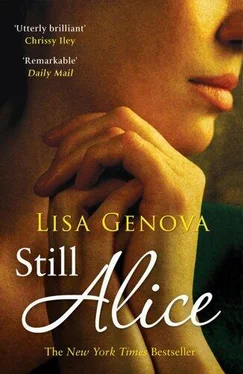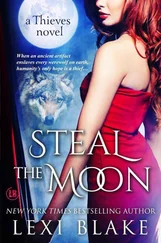How did you get involved with the National Alzheimer's Association?
Before Still Alice was even published, it seemed to me that I'd created a story that, although fictional, was in fact a truthful and respectful depiction of life with Alzheimer's. And it was unique in that it presented this depiction from the point of view of the person with Alzheimer's, rather than the caregiver. The lion's share of information written about Alzheimer's is from the point of view of the caregiver.
So I thought the Alzheimer's Association might be interested in the book in some way, perhaps endorsing it or providing a link to it from their website. I contacted their marketing department and gave them the link to the book's website, which I'd also created before the book was published. They responded by saying that they don't normally consider "partnering" with books, but they asked for a copy of the manuscript. Soon after that, their marketing rep contacted me, saying they loved the book. They wanted to give it their stamp of approval and asked if I would write the blog for the nationwide Voice Open Move campaign they were launching at the end of that month.
That really forced me to make a decision about the book. Still Alice wasn't published yet. It could take years for it to find a publishing house and become available to readers. Realizing that I'd created something that the Alzheimer's Association thought was valuable, that could help educate and reassure the millions of people trying to navigate a world with Alzheimer's, I felt an urgent responsibility to get the book out immediately. So I said yes to the blog and yes to the affiliation. I then self-published Still Alice. It was an opportunity I couldn't pass up.
How did you decide what information was crucial to include in Still Alice ?
I knew I'd never be able to capture everyone's experience with Alzheimer's. But I knew I could capture the essence of it. And I checked in regularly with people who have early-onset Alzheimer's to make sure it all rang true. They were my litmus test. The earliest symptoms were important to portray, to show how they are deflected and denied. I felt a duty to show what the diagnosis process should look like. For so many people with early-onset, the road to a diagnosis of Alzheimer's is long and incredibly arduous, the symptoms often mistaken for other potential culprits, like depression, for years. This is probably the only place in the book I deviated from representing the truth as it plays out for most people. I gave Alice a straight-and-narrow shot to diagnosis, both in the interest of providing an example of what should happen and of creating a story that wasn't five hundred pages long. I also felt it was important for Alice to consider suicide. I thought long and hard about the decision to include this. As with the death penalty or abortion, people have very strong opinions about the right to end your own life when faced with a terminal illness, and I didn't want to alienate any readers. But I found that everyone I knew diagnosed with Alzheimer's under the age of sixty-five had considered suicide. That's extraordinary. The average fifty-year-old doesn't think about killing himself, but every fifty-year-old with Alzheimer's does. This is where this disease forces you to go. So I felt Alice had to go there as well.
Are you working on any current writing projects?
I've begun writing my next novel, Left Neglected. This is a story about a woman in her midthirties who is like so many women I know today--multitasking all day long, trying to be everything to everyone at work and at home, spread extremely thin. One typical morning, late for work, racing in her car after dropping her kids off at school and day care, she tries to phone in to a meeting she should already be at when she takes her eyes off the road for one second too long. And in that blink of an eye, all the rapidly moving parts of her overscheduled life come to a screeching halt. She suffers a traumatic head injury. Her memory and intellect are intact. She can still talk and count. But she has lost all interest in and the ability to perceive information coming from the left side of space.
The left side of the world is gone. She has Unilateral Neglect.
She finds herself living in a bizarre hemi-existence, where she eats food only on the right side of her plate, reads only the right half of a page, and can easily forget that her left arm and hand even belong to her. Through rehabilitation, she struggles not only to recover the very idea of left, but also to recover her life, the one she had always meant to live.
While working with the Dementia Advocacy and Support Network, you spoke daily with people suffering from Alzheimer's. What was that experience like for you? What were the most common struggles that these people faced?
It's been an amazing experience. These people aren't there to be superficial or beat around the bush. They don't have the time to waste. We support each other and talk about the stuff that matters, so our conversations are often filled with vulnerability and bravery, love and humor, frustration and excitement. And when you share yourself like that, it leads to deep and intimate friendship. I truly love and admire the friends I've made through this group. Many I still know only through email. I've come to meet some in person at Alzheimer's conferences, and it's a great experience. We're colleagues in our Advocacy pursuits.
People with Alzheimer's stand on ground that is constantly shifting beneath their feet. Familiar symptoms get worse (more frequent or intensified) or new symptoms emerge, so just when people think they've adapted to it all, made all the adjustments and accommodations needed, there's more work to do. This can be frustrating, exhausting, demoralizing. I see all that.
I think the most common struggle I see people face, though, is the alienation and loneliness. Because this disease takes people out of their formerly fast-paced, personally fulfilling careers; because everyone else stays busy in their busy lives and people with this disease have to slow down; and because of the enormous stigma placed on having Alzheimer's, people with early-stage Alzheimer's find themselves extremely alone. That's why these online groups are so invaluable. They bring these people from all parts of the country together to share their common experience and break the isolation.
Do you believe we need to be more educated on Alzheimer's?
I do, especially about early-onset and the early stages of Alzheimer's. There are over a half million people in the United States alone under the age of sixty-five diagnosed with dementia, and they're not included in what gets talked about when people talk about Alzheimer's. The general public knows what the eighty-five-year-old grandparent in end stages of the disease looks and sounds like, but they have little idea what the fifty-year-old parent with Alzheimer's looks and sounds like. It's high time this group had a face and a voice.
A greater awareness of the early symptoms and experiences matters because people need to recognize the symptoms so they can get diagnosed and on proper medication sooner. It matters because people with early-onset need resources (like access to support groups) that are now primarily given to caregivers. It matters because drug companies need to start to recognize this as a sizable group worthy of inclusion in their clinical trials. Right now, many people with early-onset Alzheimer's cannot enroll in clinical trials because they are too young. It matters because families deserve to plan properly for the future, both financially and emotionally. It matters because awareness will reduce the stigma placed on people still living their lives with this disease.
Читать дальше












